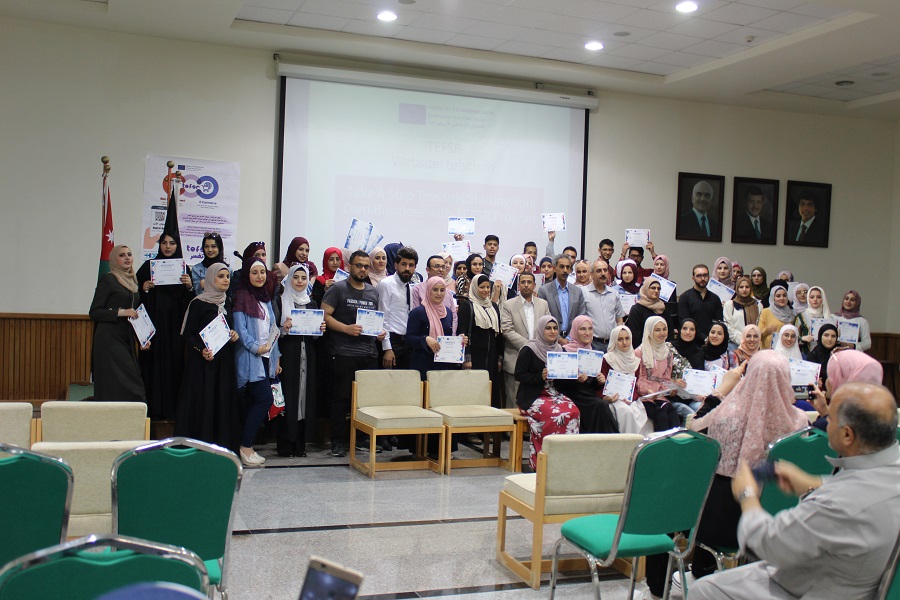
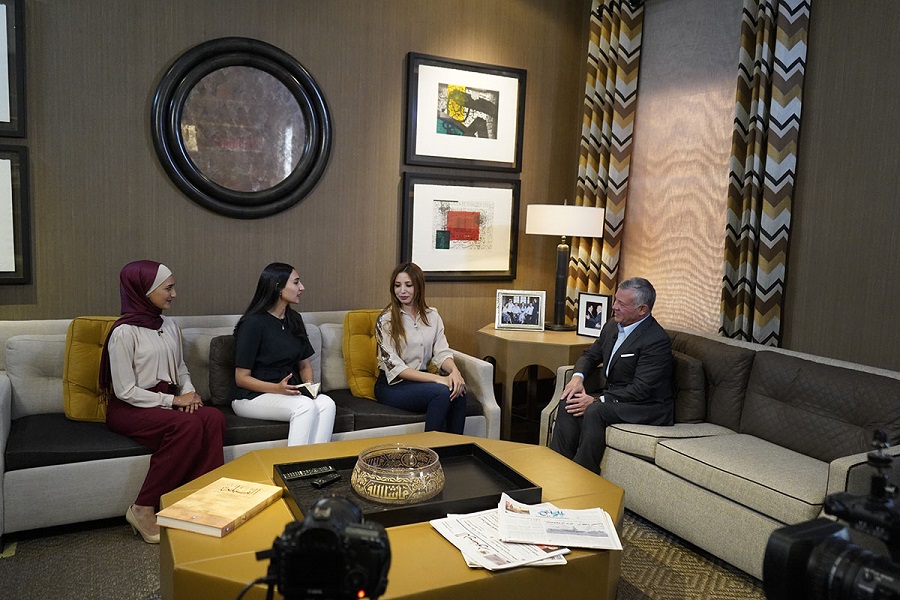
Below is the link for the meeting with His Majesty King Abdullah II by a group of students of the University of Jordan and Yarmouk University at Al Husseiniya Palace in Amman on Thursday, July 11, 2019.
https://www.youtube.com/watch?v=3YLNEOAPZdg
Jobs | Scholarships | Students | Faculty & Staff | Alumni

Below is the link for the meeting with His Majesty King Abdullah II by a group of students of the University of Jordan and Yarmouk University at Al Husseiniya Palace in Amman on Thursday, July 11, 2019.
https://www.youtube.com/watch?v=3YLNEOAPZdg
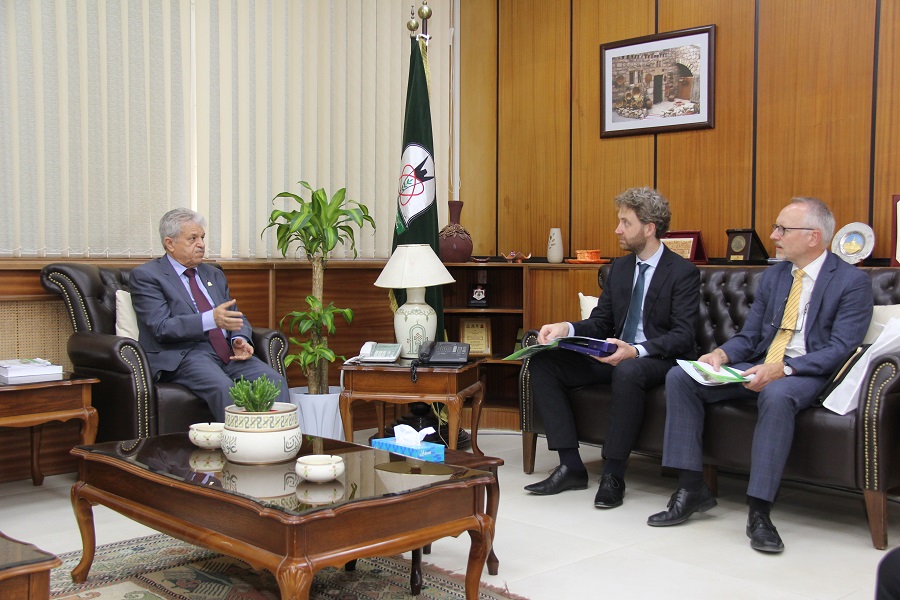
Prof Zeidan Kafafi, the President of Yarmouk University, met Tobias Karis, the Cultural Attaché of the German Embassy in Amman, and Thomas Schate, the Second Secretary of the Embassy. The meeting focused on the means of enhancing the cooperation between Yarmouk University and the German Embassy in Amman, particularly in the field of developing academic research and supporting researchers and faculty members. Also, it focused on the possibility of holding the travelling exhibition "Worlds of Culture", which emphasizes the educational aspects of preserving cultural heritage.
During the meeting, Prof. Kafafi stressed the depth of the cooperation relations between Yarmouk and the various German research and academic institutions. He expressed his hope to launch new horizons for cooperation with the German Embassy in Amman as well as the various German educational institutions. He stated that such cooperation contributes to exchanging experiences and knowledge of modern methods in teaching and scientific research. He then expressed the readiness of Yarmouk University, represented by its Faculty of Archeology, to host the travelling exhibition: "Worlds of Culture", which visits several heritage sites in the world, including the most important heritage sites in Jordan. In support of this, Prof. Kafafi explained that the Faculty of Archeology and Anthropology at Yarmouk has a set of distinguished faculty members who are keen to preserving the cultural heritage of the Jordanian society and who are ready to make use of their knowledge to studying, analyzing, and maintaining the various archeological sites in Jordan.
In his turn, Karis explained that the German Embassy chose Yarmouk University to hold the exhibition "Worlds of Culture" due to the university's pioneering scientific reputation and effective role in protecting cultural heritage. He then expressed the Embassy's keenness to strengthen its cooperation ties with Yarmouk University and contribute to the University's developmental and educational goals.
Noteworthy mentioning that this meeting was attended by Prof. Hani Hayajneh, Dean of the Faculty of Archeology and Anthropology, Prof. Hanan Malkawi, and Mukhlas Al-Abini, the Director of Public Relations and Information Department.
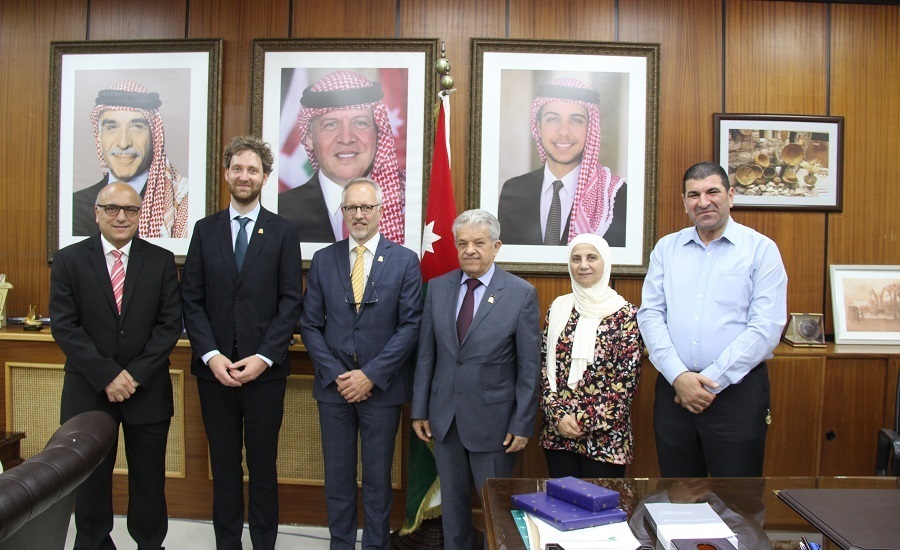
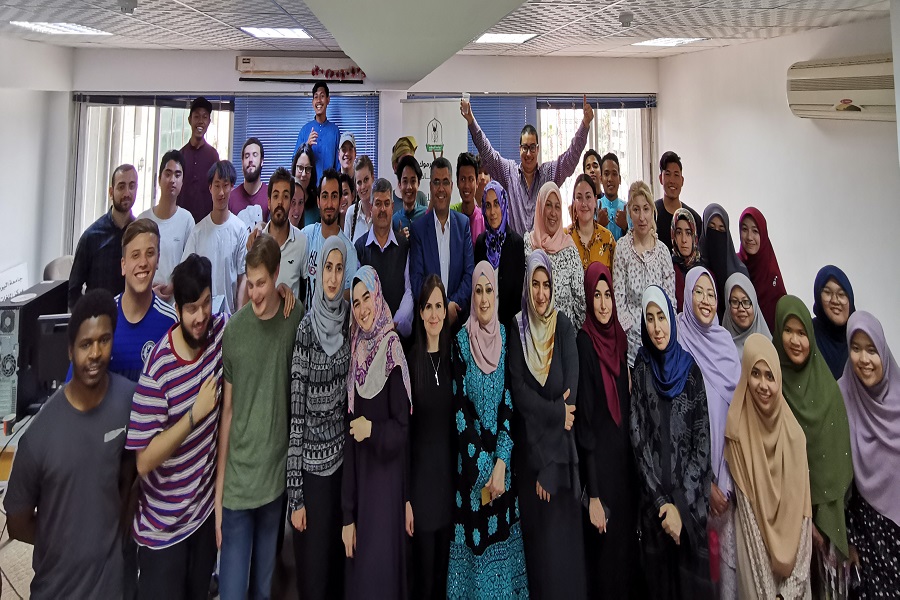
Under the patronage of Prof. Lamia Hammad, the Director of the Language Center at Yarmouk University, the Arabic Language Program for Non-Arabic Speakers organized a cultural event in celebration of the World Day for Cultural Diversity, adopted by the United Nations Educational, Scientific, and Cultural Organization (UNESCO).
Prof. Hammad explained that the celebration is to highlight the values of cultural diversity and its principles of understanding, acceptance, and respect of others and that it contributes to raising the awareness of multiculturalism and building bridges of communication among the individuals of different cultures. She also pointed out that the Arabic language program for non-Arabic speakers embodies the essence of brotherhood and harmony among students from different countries and cultures.
However, the program of the celebration included a variety of artistic performances, during which the Malaysian students performed a traditional song from their country, followed by a Chinese student song, then a Turkish track, another Spanish song, a Greek song, and a Spanish flamenco dance. It included also a table of traditional food and sweets representing the cultures of the program's students who are coming from Turkey, Spain, China, Malaysia, Korea, America, Brazil, Germany, Russia, Australia, France and Canada.
This ceremony was attended by the Deputy Director of the Center Dr. Ahmed Saifan, the assistant director of the Center for Arabic Language for non-Arabic speakers, Dr. Hala Al-Hamad, and several professors and administrators.
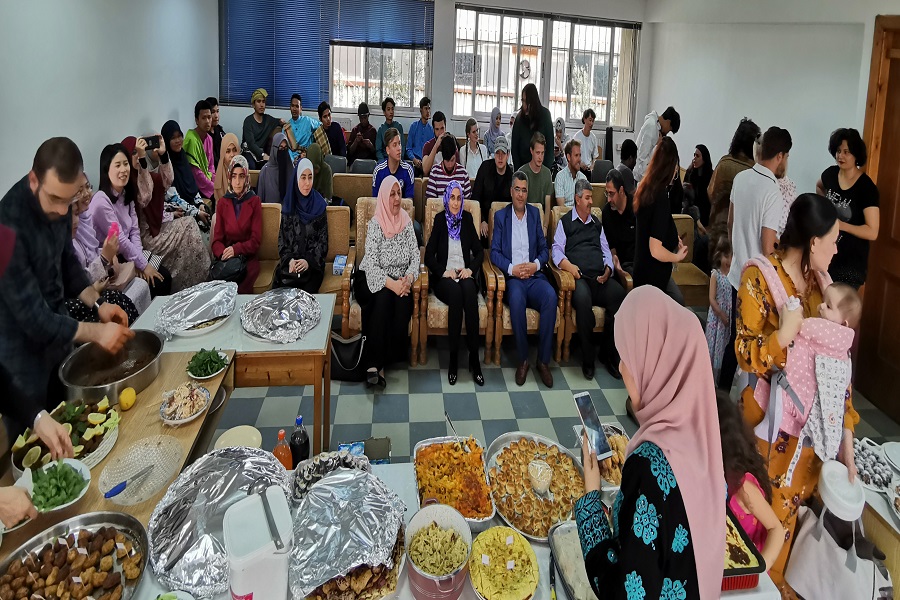
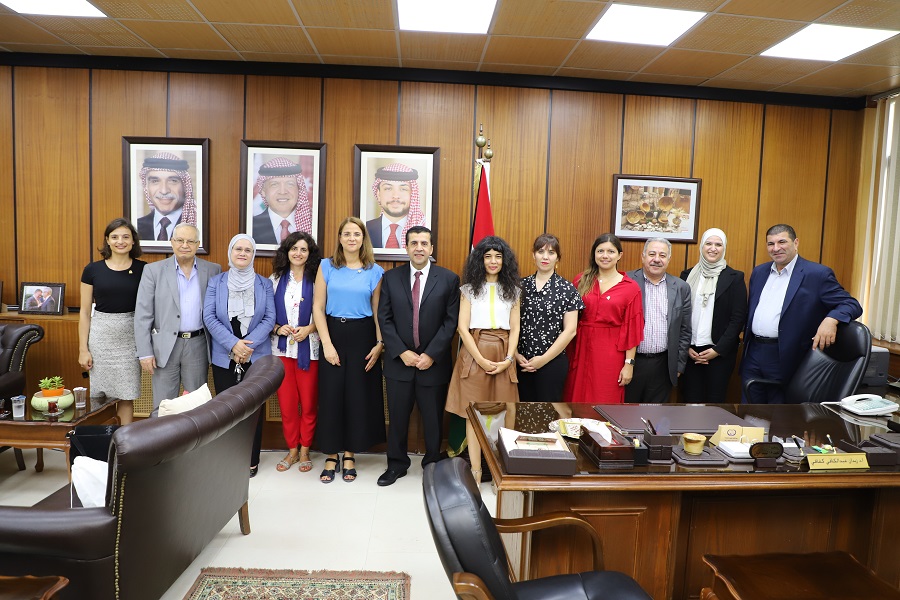
Prof. Ahmed Al-Ajlouni, the Vice President of Yarmouk University for Scientific faculties and financial affairs, discussed ways of scientific and academic cooperation with Dr. Adriana Carvalo, the Director of the Office of International Relations at the Polytechnic Institute of Portugal (IPCA).
Prof. Al-Ajlouni emphasized Yarmouk's interest in expanding its network of scientific, academic, and scholarly cooperation with international higher education institutions, thus opening new horizons for the educational process at Yarmouk. He explained that such an interest is mainly done through the exchange programs of students and the scientific visits of Yarmouk faculty members to other international universities and institutes. Thus, he highlighted the importance of enhancing student exchange programs and the scientific visits of the faculty members through Erasmus Plus. He also pointed out the establishment of Yarmouk University and its future aspirations to developing a range of disciplines in order to keep abreast of the technological developments like Cyber Technology and data science. Moreover, he mentioned that Yarmouk University had established a specialized laboratory for gaming "gaming lab" at the Faculty of Hijawi for Engineering Technology. He then stressed Yarmouk's readiness to cooperate with the IPCA Institute in areas of common interest such as tourism, hospitality, design, economics, and business administration as well as technological specializations.
In his turn, Karvelo expressed the Institute's readiness to strengthen its cooperation with Yarmouk university due to its distinguished scientific reputation. She reviewed the establishment of the Institute which grants both Bachelor and Master's degrees, holding a series of specialized courses to training students to get involved in the labor market. She also pointed out that the Institute is one of the most distinguished centers in Portugal, especially with respect to teaching accounting and taxation, and that it includes colleges of management, technology, design, tourism, and hospitality. Finally, Karvelo stated that among the main interests of the Institute is to strengthen cooperation with the various universities worldwide, a matter that positively affects the Institute's educational environment and helps its staff and students to consider others' experiences.
Noteworthy mentioning that this meeting was attended by the dean of the Faculty of Economics and Administrative Sciences, the dean of the Faculty of Tourism and Hotel Management, the Dean of the Faculty of Fine Arts, and a number of officials from both sides.
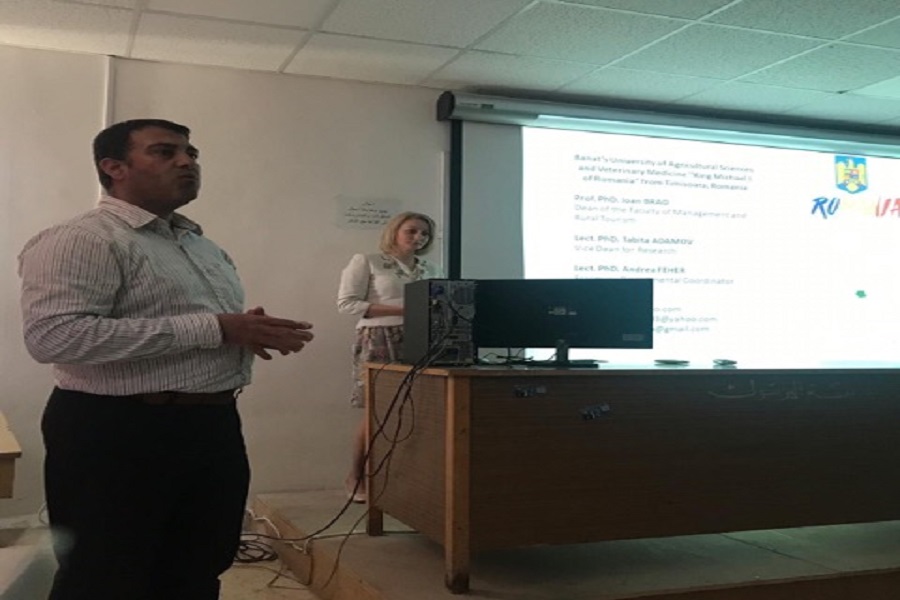
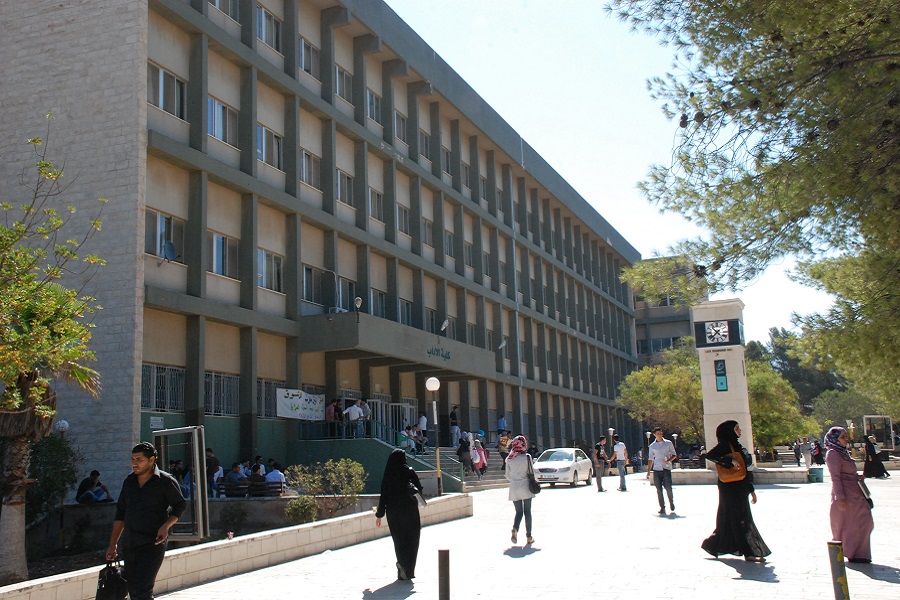
Aiming at establishing a framework for student exchange between the two universities during the academic year 2019-2020, Yarmouk University has signed a scientific cooperation agreement with the University of Nantes. According to the agreement, Nantes will receive two students of French language from Yarmouk University for one semester, beginning in September 2019. The French embassy will pay the university fees for candidates, and two courses will be credited for the students. In return, Yarmouk University should host two Master students from Nantes and provide them with the opportunity to train students of the Department of Modern Languages. The agreement also includes items for the exchange of professors and researchers between the two sides and participation in conferences and seminars held by both universities.
The President of Yarmouk University, Prof. Zeidan Kafafi, praised the support provided by the French Embassy in Amman to Yarmouk University through strengthening its academic relations with the French educational institutions like Nantes University. According to Prof. Kafafi, such a strategy offers Yarmouk students the opportunities to complete their higher studies and the faculty members to vary out academic visits, thus enabling them to access the expertise and knowledge of other universities in various disciplines. He also emphasized his support for any initiative that would serve the dissemination of French culture and language in the Jordanian society, considering that he holds the Order Knight of the French government.
The Dean of the Faculty of Arts at Yarmouk, Dr. Mohamed Bani Doumi, explained that the French Embassy has reduced the registration fees for the international Delf examination at all levels to Yarmouk University students, which confirms the depth of the cooperation between Yarmouk University and the French Embassy. He also pointed out that the signing of this agreement will provide the students of the Department of Modern Languages at Yarmouk with the opportunity to study at Nantes and improve their skills and knowledge in the field of the French language. He praised the efforts of the Department of Modern Languages, which is constantly seeking to strengthen its academic relations with the various international educational institutions that provide training and educational opportunities for its students.
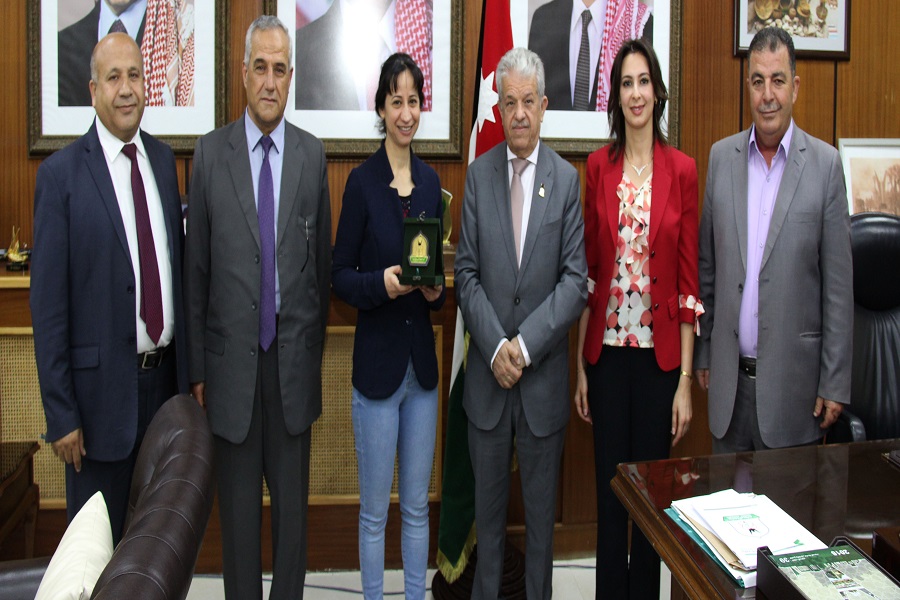
With the support of the French Embassy in Amman and the Francophone University Association, the President of Yarmouk University, Prof. Zidane Kafafi, met Salma Kojok, a training expert at the Goncourt International Prize, who was visiting the University to hold a workshop for students of the Department of Modern Languages.
During the meeting, Prof. Kafafi thanked the French Embassy in Amman and the Francophone Association for their support of holding such a workshop, which aims at introducing the University students to the Goncourt International Prize and encouraging them to apply for it. He added that Yarmouk is interested in involving its students in such competitions at the regional and international levels, as such participations have significant role in developing students' personalities and skills and enriching their scientific and cultural achievements, thus raising their competitiveness among their peers in the local as well as worldwide labor market.
In her turn, Kogok pointed out the importance of holding this workshop, which contributes to improving students' level in writing in French and enriching their cultural and scientific achievements.
Likewise, Dr. Batoul Mohaisen, the Head of the Department of Modern Languages and the Representative of the Francophone Association at the University, emphasized that the workshop effectively enhances the writing skills of students and stimulates them to write creatively. Also, she explained that the workshop lasts for two days with five- hour training per day and involves 16 students of the Department of Modern Languages.
This meeting was attended by Dr. Mohammed Bani Dumi, the Dean of the Faculty of Arts and other officials of the University.
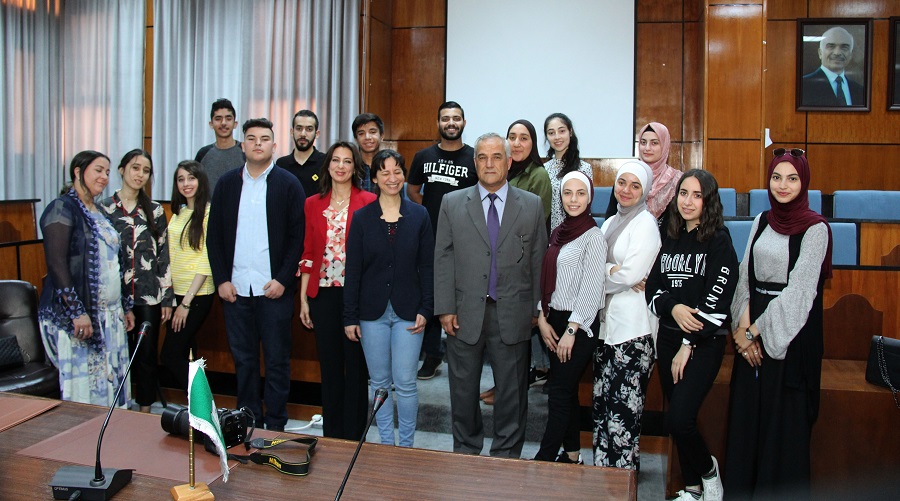
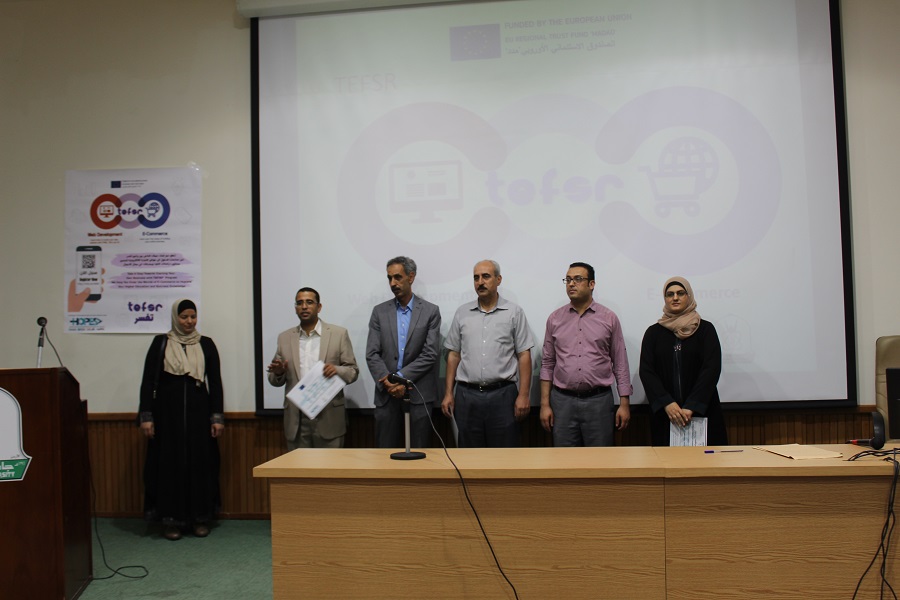
The Faculty of Information Technology and Computer Sciences and the Faculty of Hijjawi for Engineering held an awards ceremony for the CFP projects at Yarmouk University under the Grant scheme of the HOPES projects. The two projects, “Transferring E-Business Fundamentals to Syrian Refugees (TEFSR)” and “Providing Fundamental ICT Skills for Syrian Refugees (PFISR)”, are implemented by Yarmouk University as part of the Grant scheme of the HOPES project funded by European Union’s Regional Trust fund in repose to the Syrian Crisis, the ‘Madad Fund’. They are implemented by the German Academic Exchange Service (DAAD) together with the British Council, Campus France and Nuffic.
Dr. Nasser Hindawi, Director of HOPES projects in Jordan, highlighted the importance of HOPES grants to Syrian refugees in Jordan. He also asserts about the importance of such projects which can open new horizons for Syrian students in Jordanian universities. In addition, These projects can help them to build a strong career path to cope with the crisis in their country and country of displacement. The projects aim to transfer basic skills in web applications, networking, e-commerce, and computer maintenance to Syrian refugees and local community members. The dean of Hijjawi Faculty for Engineering, Prof. Ahmad Al-Shamali also pointed to the importance of this type of project and support in the development of the local community and host communities.
Dr. Amani Shatnawi from the Faculty of Information Technology presented the most important accomplishments and results achieved during the period of implementation of the projects, which showed that more than 300 students and students from the Syrian community and refugees were graduated. In accordance with the university plan to rehabilitate the students to the labor market and provide them with the necessary knowledge and expertise, more than 150 students were subjected to the intensive training program to be a trainer for trainees (ToT). Some students presented their achievements, including the student Muhannad Bani Issa from Syrian, he developed an e-commerce website for the sale of German cosmetic products, Khalid and student Mohammed Mohsen from Syria talked about the skills they are obtained in the field of computer maintenance and computer networks, that they had an impact on finding job opportunities in related to these fields.
Dr. Nasser Hendawi and Dr. Naimah Hasban from the HOPES office in Jordan and Prof. Ahmed Al-Shamali have distributed certificates to the participants. The projects team included Dr. Amani Shatnawi and Dr. Anas AlSobeh from the Faculty of Information Technology and Computer Science, and Prof. Dr. Mohammad Al-Jarrah, Dr. Abdulkarim Al-Tamimi and Dr. Amin Al-Jarrah from the Faculty of Hijjawi for Technological Engineering.
